Binance Labs Invests in Kernel: Pioneering the Future of Restaking on BNB Chain
AI is revolutionizing smart contract auditing by offering unmatched precision and efficiency in identifying vulnerabilities and ensuring secure transactions. Traditional manual audits often struggle to detect subtle coding flaws or overlooked risks, but AI-powered tools can analyze vast amounts of data quickly and accurately, scanning smart contracts for potential security issues, logical errors, and inconsistencies. By leveraging machine learning algorithms and pattern recognition, AI systems are capable of identifying vulnerabilities that might otherwise go unnoticed, minimizing human error and increasing reliability.
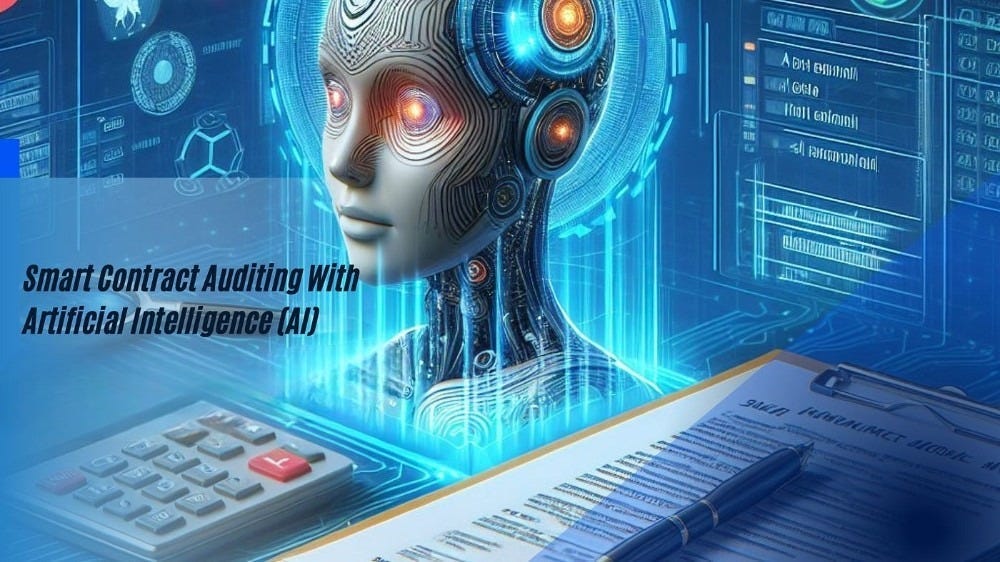
Additionally, AI tools continuously learn and adapt, improving their auditing capabilities over time, making them an invaluable asset for blockchain developers and businesses. The integration of AI in smart contract auditing not only accelerates the process but also reduces the cost and complexity of maintaining secure decentralized applications. With AI’s precision, companies can confidently deploy smart contracts, knowing that the risks of exploitation or failure are significantly lowered, ensuring a safer blockchain ecosystem.
What is AI-Powered Smart Contract Auditing?AI-powered smart contract auditing refers to the use of artificial intelligence technologies to automatically analyze and assess the security, functionality, and reliability of smart contracts. Traditional auditing methods often rely on manual inspection, which can be time-consuming and prone to human error. In contrast, AI-powered tools leverage machine learning, natural language processing, and pattern recognition to thoroughly scan smart contract code for vulnerabilities, bugs, and security risks at a much faster pace.
These AI tools are trained on vast datasets, allowing them to detect both known and emerging vulnerabilities that could potentially lead to costly exploits or failures. By automating the auditing process, AI improves the accuracy and efficiency of identifying issues, reducing the risk of oversight. Additionally, AI-based systems continuously learn from new data and adapt to evolving threats, ensuring that smart contract audits are always up-to-date. With AI-powered auditing, developers can streamline the deployment of secure and reliable smart contracts, fostering trust in decentralized applications and minimizing the risks associated with blockchain-based systems.
Benefits of AI-Powered Smart Contract AuditingAI-powered smart contract auditing is transforming the way blockchain applications are reviewed and secured. Traditional smart contract audits rely on manual code review, which can be time-consuming and prone to human error. By integrating artificial intelligence (AI) into the auditing process, smart contract security can be significantly enhanced. Here are some key benefits of AI-powered smart contract auditing:
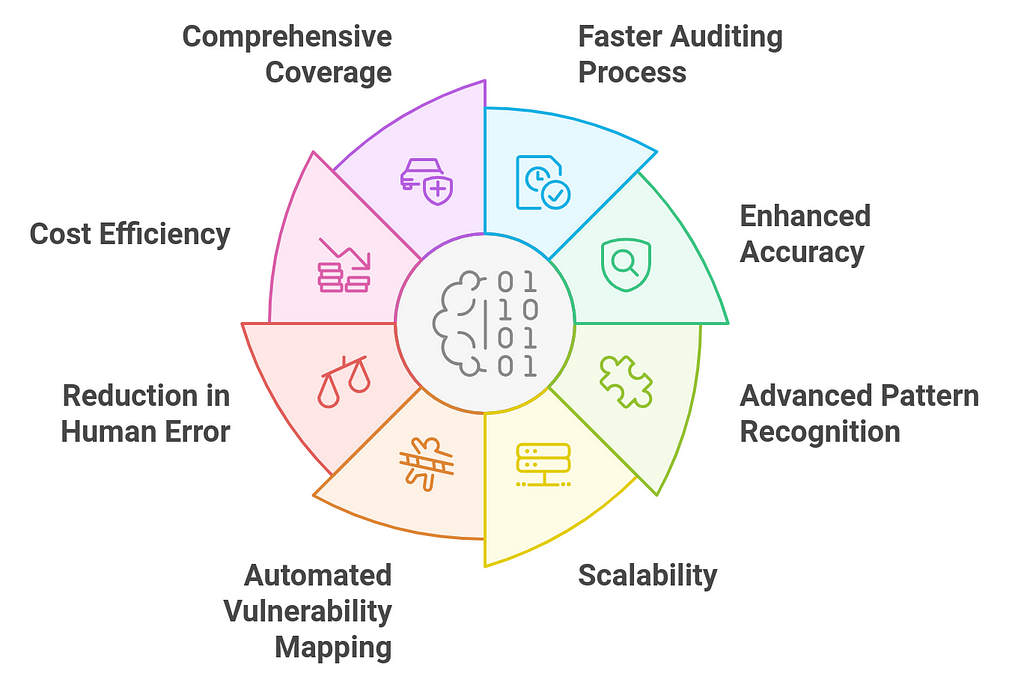 1. Faster Auditing Process
1. Faster Auditing Process- Automated Code Analysis: AI tools can quickly scan large amounts of code to identify potential vulnerabilities, errors, and inefficiencies. This speeds up the auditing process by reducing the need for manual code review and allowing auditors to focus on high-level issues.
- Real-time Auditing: AI can perform continuous, real-time analysis of smart contract code during development, allowing developers to address vulnerabilities before they make it to production.
- Error Detection: AI models are trained to recognize known vulnerability patterns and issues that could be overlooked by human auditors. This results in fewer missed errors and reduces the risk of exploits in deployed smart contracts.
- Consistency: AI systems are not subject to human fatigue or oversight, ensuring consistent audits across contracts, regardless of their complexity or size.
- Learning from Previous Audits: AI can leverage data from past audits, continuously learning and improving its ability to identify vulnerabilities, even in novel code or unexpected patterns.
- Behavioral Analysis: AI can also analyze smart contract behavior under different conditions, identifying unusual patterns or logic errors that may lead to security breaches, such as reentrancy attacks or gas-limit vulnerabilities.
- Handling Large Contracts: AI-powered tools can efficiently process smart contracts of varying sizes and complexities. As blockchain projects scale and smart contracts become more intricate, AI enables auditors to perform thorough assessments quickly and efficiently.
- Bulk Auditing: AI allows auditing of multiple smart contracts in bulk, ensuring that entire ecosystems of decentralized applications (dApps) can be reviewed and secured at once.
- Vulnerability Detection: AI-powered auditing tools can automatically detect a wide range of known vulnerabilities, including:
- Reentrancy attacks
- Integer overflows/underflows
- Gas optimization issues
- Access control flaws
- Timestamp dependence issues
- Risk Assessment: AI tools can prioritize vulnerabilities based on severity, making it easier to address the most critical issues first.
- Elimination of Bias: Unlike human auditors who may inadvertently overlook vulnerabilities or misinterpret code, AI systems follow predefined logic to analyze smart contracts, minimizing errors caused by bias, inexperience, or fatigue.
- Continuous Improvement: AI systems are constantly updated with new information, ensuring they are always equipped with the latest techniques for spotting vulnerabilities, unlike human auditors who may need additional training.
- Reduced Labor Costs: Automated audits can significantly reduce the amount of manual labor involved in the auditing process, leading to cost savings for developers and businesses. This makes security audits more affordable and accessible, especially for smaller projects.
- Minimized Risk of Exploits: By identifying vulnerabilities early, AI-powered auditing tools help prevent costly exploits and security breaches that can result in financial loss or reputational damage.
- Holistic Security Check: AI systems can assess all aspects of smart contract security, including:
- Code quality
- Logical consistency
- Compliance with best practices
- Integration with other contracts or platforms
- Cross-Platform Compatibility: AI tools can also assess how smart contracts interact with other protocols or blockchain platforms, ensuring that there are no unexpected vulnerabilities introduced during integration.
- Simulating Contract Execution: AI can simulate the execution of smart contracts to predict how they will behave in various scenarios, identifying potential points of failure before the contract is deployed.
- Simulation of Edge Cases: AI can explore edge cases or less obvious vulnerabilities that might arise during contract execution, something that might be difficult for human auditors to account for without extensive testing.
- Regulatory Compliance: AI tools can be trained to detect compliance issues, ensuring that smart contracts adhere to the necessary legal requirements, particularly in industries such as finance and healthcare, where regulatory standards are stringent.
- Audit Trails: AI-powered auditing systems can maintain detailed logs of the auditing process, which can be used to verify the audit results and demonstrate compliance to regulators.
- Post-Deployment Monitoring: AI can be used for continuous monitoring of smart contracts even after deployment. If any vulnerabilities emerge or if changes to the blockchain ecosystem affect the contract’s behavior, AI systems can alert developers to issues in real-time.
- Adaptation to New Threats: As new types of attacks emerge, AI systems can be updated with new detection capabilities, ensuring that the auditing tools remain effective against evolving threats.
- DevOps Integration: AI-powered smart contract auditing tools can be integrated into a development pipeline, enabling automated security checks during the continuous integration/continuous deployment (CI/CD) process. This ensures that security issues are identified and addressed early in the development cycle.
- Developer Feedback: AI can also provide actionable feedback to developers, guiding them to fix vulnerabilities and improve code quality, ultimately helping to foster a security-first development mindset.
- Independent Verification: With AI-powered audits, users and investors can be more confident in the security of a project. The automated and transparent nature of AI-driven audits can increase trust, particularly in decentralized finance (DeFi) and other blockchain applications where transparency is crucial.
- Audit Transparency: AI audits are often accompanied by clear reports that explain which vulnerabilities were detected, how they were mitigated, and why specific recommendations were made, helping to increase the transparency of the auditing process.
- Machine Learning and Natural Language Processing (NLP): AI can use advanced machine learning techniques to detect complex vulnerabilities that might require deeper insight into the contract’s logic. Additionally, AI systems using NLP can understand the context and nuances of comments, documentation, or codebases, improving the overall audit’s quality.
- AI-Driven Optimization: Beyond detecting vulnerabilities, AI can also suggest optimizations for improving the gas efficiency, performance, and scalability of smart contracts.
AI-powered smart contract auditing offers numerous benefits that enhance the security, efficiency, and cost-effectiveness of smart contract development. With faster auditing, better accuracy, and the ability to identify a wide range of vulnerabilities, AI is transforming how developers secure their blockchain-based applications. By automating and improving the auditing process, AI not only reduces risks but also helps organizations ensure that their smart contracts are robust, secure, and compliant with regulatory standards. This is crucial in a rapidly evolving blockchain landscape where security is paramount to maintaining trust and integrity.
Selecting the Right AI-Powered Smart Contract Auditing ServiceWhen selecting the right AI-powered smart contract auditing service, it’s important to consider several factors that can affect the quality, efficiency, and accuracy of the audit. With AI-driven tools becoming more prevalent, the key to choosing the best service lies in understanding your needs and ensuring that the service can address the specific risks and requirements of your project. Here’s a comprehensive guide on how to select the best AI-powered smart contract auditing service:
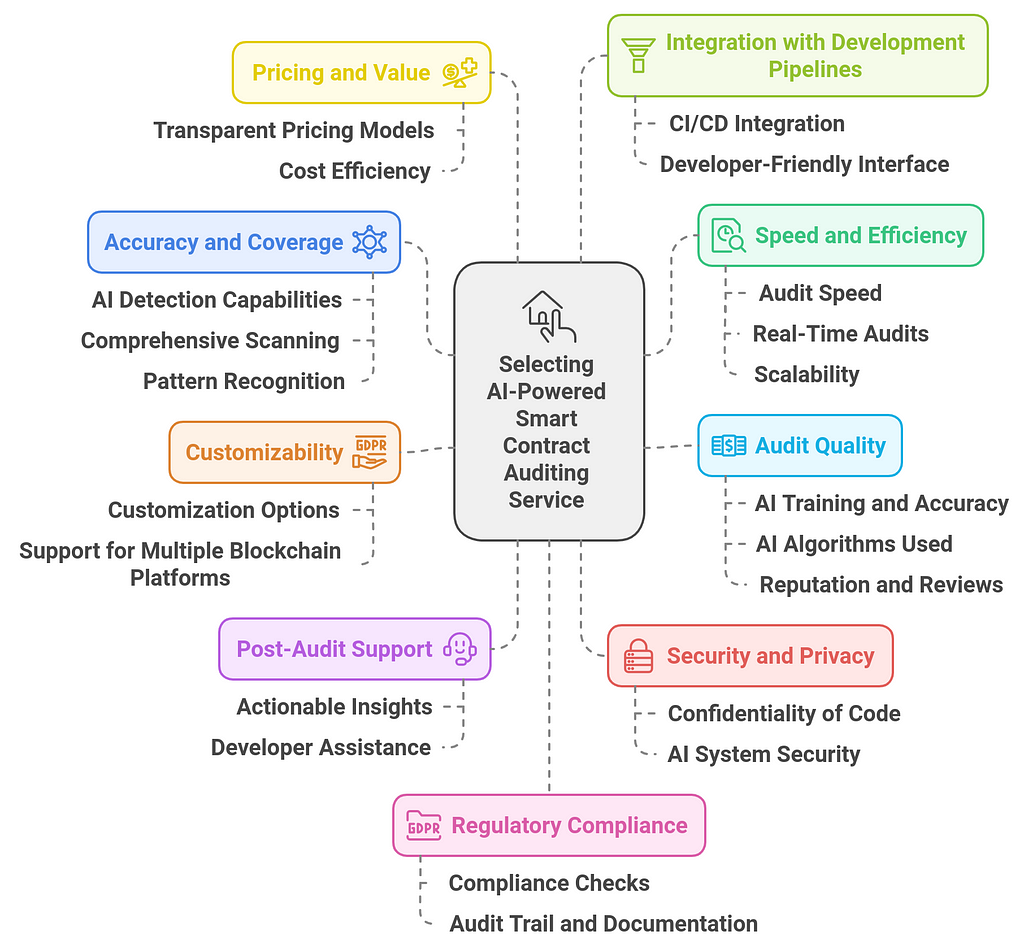 1. Accuracy and Coverage of Auditing
1. Accuracy and Coverage of Auditing- AI Detection Capabilities: Ensure that the auditing service uses advanced AI models capable of detecting a broad range of vulnerabilities such as reentrancy attacks, integer overflows, gas inefficiency, access control issues, and timestamp manipulation.
- Comprehensive Scanning: The tool should be able to thoroughly examine the smart contract code, covering edge cases, and ensuring that the entire contract, including inter-contract interactions, is audited.
- Pattern Recognition: AI tools should be able to recognize patterns of vulnerabilities from a historical dataset and adapt to new, emerging threats. The more extensive the vulnerability library the AI has, the better it can detect complex and rare issues.
- Audit Speed: AI tools typically speed up the auditing process by automating many aspects of the audit. Look for services that can perform quick audits while ensuring a comprehensive review.
- Real-Time Audits: Some AI-powered tools offer real-time analysis, allowing developers to identify and fix issues as they build, rather than waiting until the final stage of development.
- Scalability: If your project involves multiple contracts or larger applications, the service should be able to handle multiple audits at once and manage complex systems without slowing down the process.
- Customization Options: Some smart contract auditing services offer the ability to customize the audit parameters based on specific requirements or frameworks. This can be useful for unique or complex projects.
- Support for Multiple Blockchain Platforms: The service should support the blockchain platforms that your smart contracts are deployed on (e.g., Ethereum, Solana, Binance Smart Chain, etc.). Some platforms are more blockchain-agnostic, while others are specialized for certain ecosystems.
- Actionable Insights: The AI-powered auditing service should not only identify vulnerabilities but also provide actionable recommendations for fixing them. The audit report should include a severity rating for each vulnerability, outlining which issues are critical and which are less severe.
- Developer Assistance: Some services offer further support to developers post-audit, such as consulting, help with patching vulnerabilities, and follow-up audits. Look for services that offer this type of support to ensure smooth remediation.
- Confidentiality of Code: When using an AI-powered auditing service, your smart contract code is potentially shared with third-party services. Choose a provider that ensures strong privacy policies and data encryption to prevent unauthorized access to your code.
- AI System Security: The security of the AI tool itself is crucial. Make sure the platform’s AI systems are not susceptible to attacks or manipulation. The provider should also ensure secure communication channels between your development team and the auditing system.
- Transparent Pricing Models: Ensure the service offers clear and transparent pricing, so you know exactly what you’re paying for. AI-powered audits can vary in price depending on complexity, blockchain platform, and the size of the smart contract.
- Cost Efficiency: While AI auditing tools often reduce costs compared to manual audits, ensure that you’re getting good value for the price. A higher upfront cost might be worth it if the service offers faster, more comprehensive audits with a greater level of accuracy and ongoing support.
- AI Training and Accuracy: Check if the AI-powered tool is continually updated and trained on a diverse set of smart contract code. The more training data the AI has, the better it will be at identifying vulnerabilities.
- AI Algorithms Used: Different AI-powered tools may use different algorithms (e.g., machine learning, deep learning, natural language processing). Research the underlying AI technology of the auditing tool to ensure it uses proven techniques to detect vulnerabilities.
- Reputation and Reviews: Look for feedback and reviews from other developers who have used the AI auditing service. Positive reviews and a solid reputation within the blockchain community are strong indicators of a quality service.
- CI/CD Integration: Ideally, the auditing tool should integrate smoothly with your continuous integration/continuous deployment (CI/CD) pipeline. This will allow you to run automated audits as part of your development process, ensuring that vulnerabilities are detected early in the development cycle.
- Developer-Friendly Interface: The auditing tool should offer an easy-to-use interface, especially for developers who may not be experts in security auditing. Look for services that provide user-friendly dashboards and detailed, understandable audit reports.
- Compliance Checks: If your smart contract deals with regulated industries (e.g., finance, healthcare), you may need the auditing service to check for compliance with local or international regulations.
- Audit Trail and Documentation: The service should generate a thorough audit trail and documentation that can be used for compliance purposes, especially if the smart contract is being deployed in regulated environments.
- Established Provider: Look for an AI auditing service with a proven track record in the industry. Trustworthy providers have a reputation for delivering reliable and accurate audits. They may also have experience working with high-profile clients or large-scale projects.
- Industry Partnerships: Consider whether the service has partnerships with well-known blockchain projects or organizations, as this can be a sign of trust and credibility in the industry.
- Open-Source Tools: Some developers prefer open-source auditing tools, which allow for greater transparency and control. Open-source solutions might also offer more flexibility, although they may require more expertise to set up and use effectively.
- Proprietary Solutions: Proprietary AI-powered auditing tools typically offer more specialized features and better support, but they may be more expensive or less flexible.
- Long-Term Compatibility: Ensure that the auditing service you choose can grow with your project. If you plan to scale your smart contracts or deploy additional dApps, choose a provider with the capacity to handle larger contracts and ecosystems.
- Continuous Improvement: AI-powered tools should evolve with the technology, improving over time to adapt to new attack vectors and evolving best practices in smart contract development.
Selecting the right AI-powered smart contract auditing service is essential for ensuring the security and reliability of your smart contracts. The ideal service should offer fast, accurate, and comprehensive auditing with actionable insights and recommendations. It should integrate seamlessly into your development pipeline, prioritize privacy and security, and provide ongoing support as needed.
Consider the scope of coverage, AI technology, pricing models, reputation, and regulatory compliance features when evaluating services. By choosing the right AI-powered tool, you can enhance the security of your blockchain applications, reduce the risk of vulnerabilities, and ensure that your smart contracts are ready for deployment in a secure and efficient manner.
How AI Improves Accuracy and Efficiency in AuditingAI significantly improves the accuracy and efficiency of auditing, especially in the context of smart contract audits. Traditional manual auditing relies on human auditors to review each line of code, which can be time-consuming and prone to errors. By integrating AI into the auditing process, blockchain projects can benefit from faster, more precise, and more thorough audits. Here’s how AI enhances both accuracy and efficiency in the auditing process:
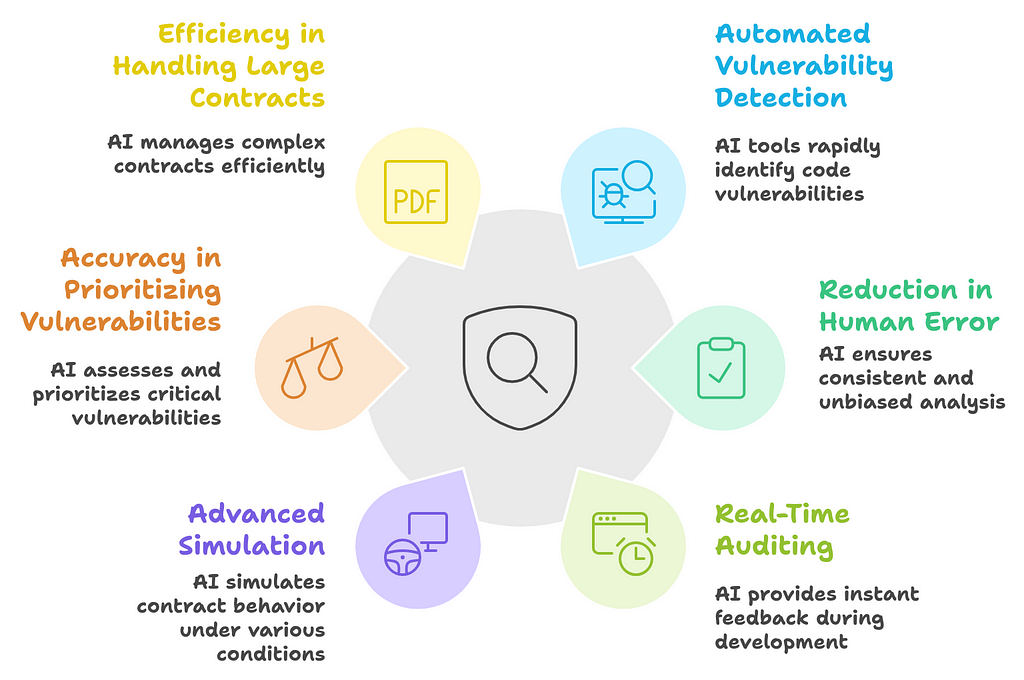 1. Automated Vulnerability Detection
1. Automated Vulnerability Detection- Speed and Scale: AI tools can rapidly analyze large volumes of smart contract code, identifying vulnerabilities and potential issues much faster than human auditors. AI can scan through entire codebases in a fraction of the time it would take a person, ensuring that no vulnerabilities are overlooked, especially in complex contracts.
- Pattern Recognition: AI models, particularly those using machine learning and deep learning, are trained to recognize patterns and behaviors commonly associated with vulnerabilities. These patterns can be hard for humans to detect, especially in large or highly complex contracts. AI-powered tools can identify vulnerabilities such as:
- Reentrancy attacks
- Gas inefficiency
- Integer overflows and underflows
- Access control weaknesses
- Timestamp manipulation
- Uninitialized variables AI models are constantly updated with data on new attack vectors, ensuring that they stay effective as threats evolve.
- Consistent Analysis: Unlike humans, AI systems are not affected by fatigue, distraction, or bias. They perform the same thorough analysis consistently, reducing the likelihood of errors or missed vulnerabilities. This consistency ensures that every contract is examined with the same level of scrutiny.
- Fewer Oversights: Human auditors might overlook edge cases or fail to detect subtle vulnerabilities in complex code. AI tools, by analyzing code according to predefined algorithms and patterns, minimize the chance of missing critical flaws that could lead to security breaches.
- Instant Feedback: AI-powered tools can provide real-time analysis as smart contracts are being developed or modified. This continuous feedback loop allows developers to fix issues on the fly, preventing vulnerabilities from becoming part of the final code. This leads to faster development cycles and better security from the outset.
- Integrated into Development Pipelines: AI can be integrated into CI/CD (Continuous Integration/Continuous Deployment) pipelines, automating the auditing process at every stage of development. Developers can receive instant notifications of issues as soon as code is committed or merged, streamlining the debugging and deployment process.
- Behavioral Analysis: AI can simulate the execution of smart contracts under different conditions, analyzing how they behave during various scenarios. This includes stress testing under different transaction volumes, interactions with other contracts, and responses to edge cases.
- Exploring Edge Cases: AI can generate and test scenarios that developers may not have considered, identifying vulnerabilities or inefficiencies that might occur in rare or unexpected situations. This deepens the audit coverage and helps identify potential failures that wouldn’t be spotted in manual testing.
- Severity Assessment: AI tools can analyze vulnerabilities not only based on their occurrence but also based on their impact and exploitability. This means that AI can help prioritize which vulnerabilities are the most urgent to fix, offering risk-based assessments that guide developers in addressing the most critical issues first.
- Contextual Understanding: AI-powered systems can assess vulnerabilities within the broader context of the smart contract and its interactions with other contracts or components. By understanding the context, AI can more accurately judge how a vulnerability might impact the overall system, providing better recommendations for mitigation.
- Bulk Auditing: AI can handle smart contracts of varying sizes and complexity without sacrificing performance. Large contracts or systems with numerous interconnected contracts are often too complex for manual auditing to be thorough and efficient. AI tools can audit multiple contracts simultaneously and provide comprehensive reports without slowing down the process.
- Faster Feedback Loop: AI systems can quickly generate feedback for entire ecosystems of contracts. This is especially important for projects involving decentralized applications (dApps) or decentralized finance (DeFi) platforms, where contracts might have thousands of lines of code or complex interdependencies.
- Gas Optimization: Beyond identifying vulnerabilities, AI can also suggest optimizations for improving gas efficiency and reducing transaction costs. For example, it can identify unnecessary computations or recommend more efficient algorithms.
- Code Refactoring Suggestions: AI can suggest improvements to the code, such as refactoring inefficient sections or optimizing logic for better performance, which can be crucial in high-throughput environments like blockchain.
- Complementary to Manual Audits: While AI tools can handle many tasks automatically, they can complement human auditors by focusing on high-priority areas. The AI-powered audit provides a first layer of analysis, which is then reviewed by human experts for deeper inspection and validation.
- Cross-Platform Compatibility: AI auditing tools can integrate with other security services, offering a holistic approach to security. They can work with penetration testing tools, automated test suites, and code analysis frameworks, improving the overall security posture of the project.
- Adapting to New Threats: AI-powered tools are designed to learn from previous audits and adapt to new attack vectors. This allows AI systems to remain relevant and effective even as new threats emerge in the blockchain ecosystem.
- Customizable Algorithms: Many AI-powered auditing tools allow for customization, enabling developers to tailor the tool to their specific contract’s needs or specific vulnerabilities that are more relevant to their use case. This flexibility improves the overall accuracy of the audit, as it can target specific concerns.
- Reduced Costs for Continuous Auditing: AI-powered tools can help reduce the overall cost of audits by automating much of the process. Automated auditing reduces the reliance on expensive manual audits, especially for repetitive tasks, making security more accessible for projects of all sizes.
- Early Issue Detection: By identifying vulnerabilities early in the development process, AI tools help prevent costly fixes later on, saving both time and money.
AI enhances both the accuracy and efficiency of smart contract auditing by automating complex tasks, improving the detection of vulnerabilities, and speeding up the process. The reduced risk of human error, real-time auditing capabilities, and the ability to simulate contract behavior make AI-powered audits a powerful tool for improving the security of blockchain projects. By leveraging AI in the auditing process, developers can ensure faster, more accurate audits while addressing vulnerabilities proactively before they lead to significant risks or losses.
AI’s Precision in Identifying Common and Complex VulnerabilitiesAI’s precision in identifying both common and complex vulnerabilities in smart contracts is one of its key advantages over traditional auditing methods. Through advanced machine learning algorithms, AI can quickly analyze large volumes of code, recognizing patterns and pinpointing issues that might be missed by human auditors. Common vulnerabilities, such as reentrancy attacks, overflow/underflow errors, and improper access control, are easily detected by AI tools, thanks to their ability to scan and process code at high speed.
What sets AI apart is its ability to identify more complex vulnerabilities, such as subtle logical flaws or novel exploit techniques, by learning from vast datasets of previously discovered vulnerabilities. AI systems continuously adapt and improve, ensuring they stay ahead of emerging risks. This allows them to detect both well-known and new vulnerabilities with remarkable accuracy, minimizing the potential for exploitation. As a result, AI enhances the reliability and security of smart contracts, ensuring safer blockchain applications.
AI Tools and Techniques Used in Smart Contract AuditingAI tools and techniques used in smart contract auditing leverage advanced algorithms to identify vulnerabilities, improve efficiency, and enhance the reliability of blockchain applications. Here’s an overview of the key tools and techniques employed:
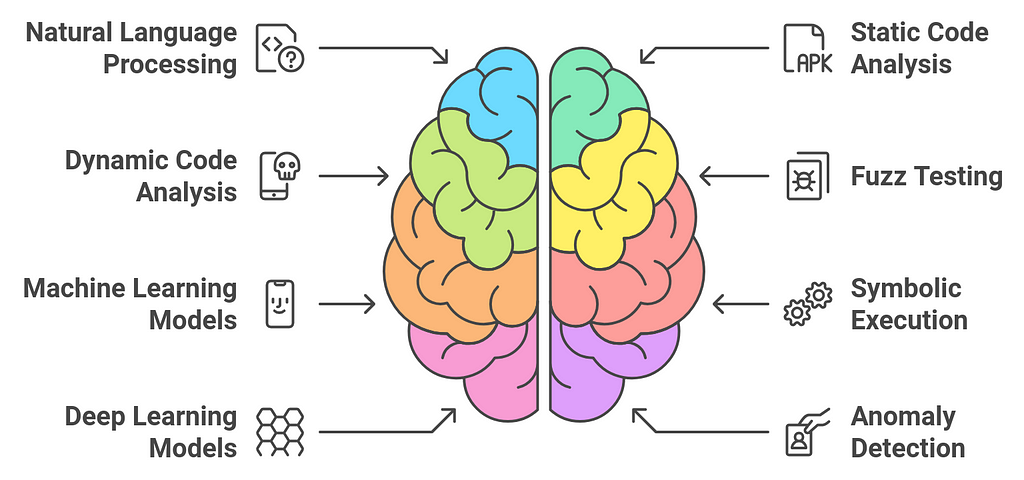 1. Natural Language Processing (NLP)
1. Natural Language Processing (NLP)Purpose: Understand comments, documentation, and contextual code logic.
- Role in Auditing:
NLP techniques analyze the context of comments and documentation within the codebase, helping to ensure that the actual logic matches the intended functionality. - Example Use Case:
Detecting discrepancies between a contract’s documentation and its implementation, such as when a function intended to handle user funds lacks proper safeguards.
Purpose: Examine code without executing it to identify vulnerabilities.
- Role in Auditing:
AI tools analyze the codebase for known patterns of vulnerabilities (e.g., reentrancy attacks, integer overflow/underflow) and flag them for review.
Example Tools:
- MythX: Provides a comprehensive static analysis of Ethereum smart contracts.
- Slither: Focuses on efficiency and gas optimization for Solidity contracts.
Purpose: Test smart contract behavior by executing it in simulated environments.
- Role in Auditing:
AI-driven simulation tools model contract execution under various scenarios, revealing potential runtime vulnerabilities.
Example Tools:
- Manticore: Symbolic execution tool for exploring all possible states of smart contract code.
- Echidna: A fuzzing tool that generates random inputs to stress-test contracts.
Purpose: Identify vulnerabilities by feeding random and unexpected inputs to contracts.
- Role in Auditing:
AI-powered fuzzers generate edge cases and unusual scenarios to uncover logic errors or vulnerabilities, such as invalid state transitions or unexpected gas consumption.
Example Tools:
- Echidna: Uses property-based testing to validate smart contract invariants.
- Foundry Fuzzing: A tool for creating comprehensive test cases.
Purpose: Recognize patterns and anomalies based on training data.
- Role in Auditing:
ML models are trained on historical vulnerabilities, allowing them to predict and identify new or emerging threats with high accuracy.
Techniques Used:
- Supervised Learning: Trains on labeled datasets of secure and insecure contracts.
- Unsupervised Learning: Identifies anomalies without prior knowledge of vulnerabilities.
- Reinforcement Learning: Improves vulnerability detection iteratively based on feedback from previous audits.
Purpose: Explore all possible execution paths to ensure contract correctness.
- Role in Auditing:
AI systems use symbolic execution to simulate different states of a contract to identify potential issues like reentrancy, unhandled exceptions, or gas inefficiencies.
Example Tools:
- Manticore: Examines Solidity contracts for all possible outcomes.
- Oyente: A tool designed for Ethereum smart contracts, focusing on execution paths.
Purpose: Detect complex patterns and interactions in smart contracts.
- Role in Auditing:
Deep learning models can handle large and complex codebases, learning to recognize vulnerabilities that may not fit traditional patterns. They are particularly effective for identifying vulnerabilities in novel contract architectures.
Techniques Used:
- Convolutional Neural Networks (CNNs): For code pattern recognition.
- Recurrent Neural Networks (RNNs): For understanding sequences of code logic.
Purpose: Identify deviations from expected contract behavior.
- Role in Auditing:
AI models compare a contract’s logic and execution patterns to those of known secure contracts, flagging deviations as potential vulnerabilities.
Techniques Used:
- Clustering: Groups similar contracts to identify outliers.
- Statistical Models: Flags rare or unexpected behavior during testing.
Purpose: Forecast potential vulnerabilities based on contract design.
- Role in Auditing:
Predictive models analyze how design choices could introduce risks, allowing developers to preemptively address potential flaws.
Applications:
- Predicting gas consumption inefficiencies.
- Identifying scalability issues in multi-contract systems.
Purpose: Improve auditing algorithms through iterative learning.
- Role in Auditing:
AI systems use reinforcement learning to refine their detection capabilities over time. With each audit, the model becomes better at identifying vulnerabilities by learning from its mistakes and successes. - Example Application:
Enhancing fuzzing tools to generate more effective test cases.
Purpose: Analyze relationships and interactions within contracts.
- Role in Auditing:
Contracts often interact with one another in dApp ecosystems. Graph analysis helps AI tools understand these interactions to identify security risks arising from dependencies or cyclical interactions.
Example Tools:
- Graph-based dependency analysis for identifying vulnerable contract interactions.
- Analyzing inter-contract communication to ensure security.
Purpose: Provide tailored solutions for blockchain development.
- Role in Auditing:
These frameworks are designed specifically for blockchain use cases, offering tools for auditing, vulnerability detection, and optimization.
Example Frameworks:
- ChainSecurity: Specializes in automated vulnerability detection for Ethereum.
- Mythril: Uses AI for detecting common vulnerabilities in Solidity contracts.
Purpose: Ensure efficient resource usage in smart contracts.
- Role in Auditing:
AI systems analyze contract logic to suggest optimizations that reduce gas consumption without altering functionality. This is particularly useful for contracts running on cost-sensitive networks like Ethereum.
Purpose: Stay updated with evolving security threats.
- Role in Auditing:
Continuous learning systems use new data from security breaches and vulnerabilities to keep AI models updated. This ensures the tool remains effective against emerging attack vectors. - Example Implementation:
Models updated with information from incidents like reentrancy attacks in decentralized finance (DeFi).
Purpose: Combine AI techniques with human expertise.
- Role in Auditing:
Hybrid systems use AI for initial vulnerability detection and human experts for in-depth review and validation. This approach ensures that no vulnerabilities are missed while leveraging the strengths of both AI and manual methods.
AI tools and techniques bring unparalleled efficiency, accuracy, and scalability to smart contract auditing. By combining approaches such as machine learning, symbolic execution, fuzz testing, and predictive analysis, AI-powered tools offer comprehensive solutions that surpass traditional auditing methods. As blockchain ecosystems grow in complexity, these tools will become increasingly indispensable for ensuring the security and reliability of smart contracts.
The Future of AI in Smart Contract AuditingThe future of AI in smart contract auditing is poised to bring transformative advancements to blockchain security. As blockchain ecosystems grow in complexity, the role of AI in auditing will evolve to meet emerging challenges and opportunities. Here are the key trends and developments shaping the future:
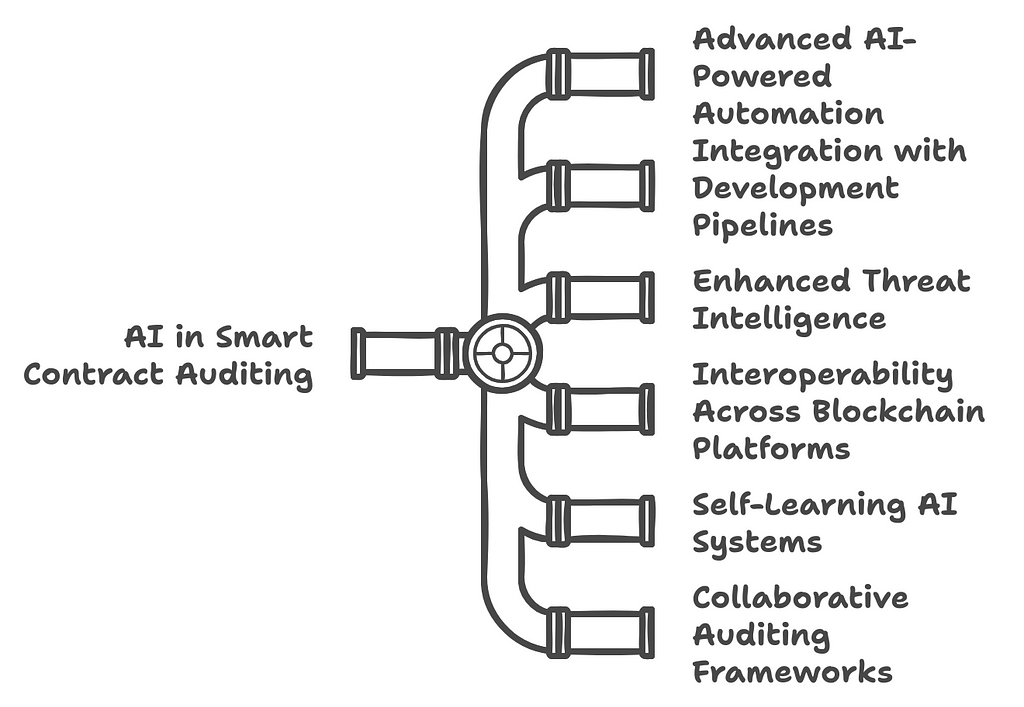 1. Advanced AI-Powered Automation
1. Advanced AI-Powered Automation- End-to-End Auditing: Future AI tools will automate the entire audit lifecycle, from initial code scanning to generating compliance reports, minimizing human intervention.
- Real-Time Deployment Audits: AI will enable live monitoring and auditing of smart contracts post-deployment to identify and mitigate vulnerabilities as they emerge.
- Seamless CI/CD Integration: AI auditing tools will become integral parts of Continuous Integration/Continuous Deployment (CI/CD) pipelines, enabling continuous, real-time security checks as developers write and deploy code.
- Proactive Development Support: AI systems will act as intelligent assistants, providing on-the-fly security suggestions and optimizations during the coding process.
- Evolving Attack Models: AI will incorporate real-time data from blockchain exploits and security breaches to adapt and stay ahead of emerging threats.
- Predictive Threat Analysis: AI tools will predict potential vulnerabilities based on historical data, coding patterns, and behavioral analysis of contracts.
- Cross-Platform Auditing Tools: AI solutions will evolve to support multiple blockchain platforms (e.g., Ethereum, Solana, Cardano, Sui), offering unified security solutions for diverse ecosystems.
- Standardized Security Frameworks: AI tools will help establish universal security standards, ensuring interoperability and trust across platforms.
- Reinforcement Learning: AI auditing tools will leverage reinforcement learning to improve themselves continuously, learning from each audit and adapting to new vulnerabilities.
- Autonomous Updates: These systems will independently update their models with the latest security trends and attack vectors.
- Decentralized AI Auditors: Future systems may use decentralized AI models, powered by blockchain, to enable collaborative and transparent auditing.
- Human-AI Collaboration: Hybrid systems will combine the efficiency of AI with human expertise to deliver the most robust audits.
- Continuous Security Monitoring: AI tools will provide continuous, real-time monitoring of deployed smart contracts, ensuring that vulnerabilities are detected and mitigated before exploitation.
- Autonomous Self-Healing: Future AI systems might enable contracts to automatically repair vulnerabilities without requiring human intervention.
- Custom Audits: AI will offer personalized auditing tailored to specific contract requirements, industry regulations, or developer needs.
- Dynamic Adaptation: Auditing models will dynamically adjust to handle the unique challenges of different use cases, such as DeFi, NFTs, or supply chain contracts.
- Explainable AI (XAI): As AI systems grow in complexity, there will be a push toward greater transparency. Future AI auditors will provide clear, understandable explanations for their findings and recommendations.
- Trust in AI Decisions: Improved transparency will enhance trust in AI-powered audits, making them more acceptable to developers, regulators, and users.
- Compliance Automation: AI tools will help projects comply with evolving regulations by automatically verifying that contracts meet legal and security standards.
- Regulator-Friendly Reports: Audit reports generated by AI will align with regulatory requirements, streamlining approval processes.
- Blockchain-Powered AI Auditing: Decentralized networks of AI auditors, powered by blockchain, will provide community-driven, transparent, and tamper-proof auditing services.
- Crowdsourced Security Enhancements: Developers and users will contribute data to improve decentralized AI auditing models.
- Affordable Audits: AI-powered auditing tools will lower the cost of security for startups and smaller projects, democratizing access to high-quality audits.
- Scalability: These tools will scale to handle projects of any size, ensuring that even large ecosystems benefit from robust security.
- Layered Defense: AI auditing will integrate with other security measures, such as penetration testing, multi-signature systems, and behavioral monitoring, to provide a comprehensive security framework.
- Multi-Contract Ecosystems: AI will efficiently audit interconnected contracts in dApps and DeFi ecosystems, ensuring seamless security across layers.
- Scenario Simulation: AI tools will create more realistic and advanced simulations to test smart contracts under various conditions, including extreme stress and malicious attacks.
- Behavioral Insights: These simulations will analyze contract interactions and user behavior to identify potential vulnerabilities or inefficiencies.
- Bias-Free Analysis: Future AI systems will address concerns about bias and ensure fair, impartial, and accurate auditing for all projects.
- Ethical Data Use: Developers and auditors will ensure that data used to train AI models respects privacy and complies with ethical standards.
The future of AI in smart contract auditing is characterized by automation, adaptability, and collaboration. By evolving to handle increasingly complex blockchain ecosystems, AI will ensure faster, more accurate, and cost-effective audits. Its role in real-time monitoring, self-healing systems, and regulatory compliance will make it indispensable for securing the blockchain ecosystem, driving innovation, and building trust in decentralized technologies.
The Challenges of Traditional Smart Contract AuditingTraditional smart contract auditing faces several challenges that can impact the efficiency and effectiveness of the process. One of the main issues is the reliance on manual inspection, which is time-consuming and prone to human error. Auditors must thoroughly review complex lines of code, often without the ability to spot every potential vulnerability or exploit. Additionally, the rapidly evolving nature of blockchain technology means that auditors may not be familiar with the latest attack vectors, leaving gaps in the review process.
Furthermore, as smart contracts become more intricate, traditional auditing struggles to keep up with the sheer volume and complexity of code. This can result in higher costs and longer timelines for audits. Lastly, the risk of oversight increases as human auditors may miss subtle issues or fail to detect new vulnerabilities in a fast-changing landscape. These challenges highlight the need for more advanced, automated solutions like AI to improve the reliability and scalability of smart contract auditing.
ConclusionIn conclusion, AI significantly enhances smart contract auditing by bringing precision, speed, and reliability to the process. By automating the detection of vulnerabilities, logical errors, and potential exploits, AI eliminates much of the human error and inefficiencies associated with traditional auditing methods. Its ability to analyze large-scale data and adapt to evolving security threats makes it an invaluable tool in the blockchain industry. With continuous learning, AI tools improve over time, ensuring that audits stay ahead of emerging risks and vulnerabilities.
As blockchain technology continues to grow and smart contracts become more complex, AI’s role in auditing will be crucial to maintaining the integrity and security of decentralized applications. By integrating AI-driven solutions, companies can streamline their smart contract development process while ensuring the highest level of security, reducing both time and costs. Ultimately, AI is not just a tool for enhancing precision in auditing but also a key enabler for building a safer, more robust blockchain ecosystem.
How Can AI Enhance Smart Contract Auditing with Its Precision? was originally published in Coinmonks on Medium, where people are continuing the conversation by highlighting and responding to this story.
